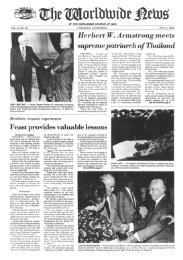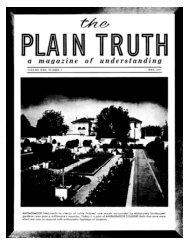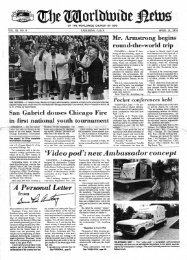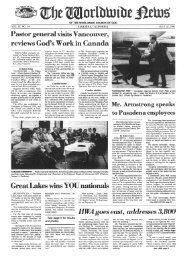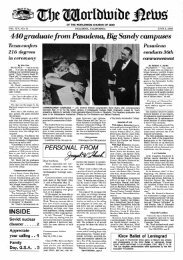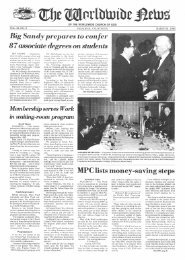PT Sep-78 - Herbert W. Armstrong Library and Archives
PT Sep-78 - Herbert W. Armstrong Library and Archives
PT Sep-78 - Herbert W. Armstrong Library and Archives
Create successful ePaper yourself
Turn your PDF publications into a flip-book with our unique Google optimized e-Paper software.
Why the United Nations Won't Act<br />
In the face of the terrible suffering<br />
which has taken place in Cambodia<br />
for the last three <strong>and</strong> a half<br />
years, one would think that a body<br />
called the United Nations Commission<br />
on Human Rights would at<br />
least have issued, in the name of<br />
simple humanity, a condemnation<br />
of Khmer Rouge brutality.<br />
But the Human Rights Commission's<br />
response has been feeble indeed.<br />
The body, which regularly<br />
issues condemnations of the world's<br />
"approved whipping boys"-Israel,<br />
South Africa <strong>and</strong> Chile-recently reluctantly<br />
managed to send the record<br />
of "allegations" of human rights<br />
violations to the government of<br />
what 1S now called "Democratic<br />
Kampuchea," inviting it to respond.<br />
This action was the product of a<br />
British-sponsored initiative originally<br />
calling in strong terms for a<br />
"complete investigation" into the<br />
atrocities committed by the Khmer<br />
Rouge. Before the resolution could<br />
be passed, however, it had to be<br />
considerably watered down to satisfy<br />
the Third World block on the<br />
Human Rights Commission.<br />
For their own part, the Western<br />
delegates involved stress that getting<br />
the Human Rights Commission to<br />
take even the most emasculated action<br />
against any country other than<br />
Israel, South Africa or Chile is a tremendous<br />
step forward. They point<br />
out that countries like the Soviet<br />
Union <strong>and</strong> Ug<strong>and</strong>a have seats on<br />
the Human Rights Commission,<br />
which makes it difficult to get anything<br />
done.<br />
In the Cambodian case, the<br />
Khmer Rouge surprised everyone<br />
by even deigning to respond to the<br />
grave allegations of genocide. But<br />
the nature of their response was no<br />
surprise. Ignoring the charges, they<br />
instead accused the British of the<br />
very crimes they have committed<br />
themselves. The Kampuchean Foreign<br />
Ministry said: "The English<br />
imperialists, therefore, have no right<br />
to speak of the rights of man. More<br />
than that, they are the ones who are<br />
accused. The world knows well their<br />
barbarous <strong>and</strong> abject nature. The<br />
world knows that m Britain the<br />
. English imperialist monopoly capitalists<br />
are living in opulence on top<br />
of piles of corpses, belonging to<br />
those whom they have pillaged, exploited<br />
<strong>and</strong> oppressed. across the<br />
centuries."<br />
Why are the Third World countries<br />
so loathe to condemn the worst<br />
horrors smce World War II? A<br />
member of a Western delegation<br />
told The Plain Truth that the main<br />
reason is that if the horrors in one<br />
Third World country, Cambodia,<br />
are exposed today, the horrors in<br />
other Third World countries will<br />
reach the light of day tomorrow.<br />
The Third World delegates feel that<br />
if a strong anti-Khmer Rouge resolution<br />
came out of the Human<br />
Rights Commission, it would be<br />
"their turn next."<br />
Beyond this, Third World countries<br />
are very jealous about their sovereign<br />
pride. They consider human<br />
rights violations to be internal matters,<br />
the exposure of which might<br />
breach <strong>and</strong> infringe upon their<br />
sovereignty. And, as one delegate<br />
told us, Third World countries are<br />
loathe to take any criticism of any<br />
kind from their "former colonial masters,"<br />
the Western powers. Of course,<br />
it is only the Western powers who are<br />
likely to bring up the matter of human<br />
rights violations in Communist or socialist<br />
countries.<br />
For their own part, there is even a<br />
reluctance among some Western delegations,<br />
including that of the<br />
United States, to really get vociferous<br />
about the horrors in socialist<br />
or Communist countries such as<br />
Cambodia. Part of the reason for<br />
this is Guilt (with a capital "G")<br />
over participation by the United<br />
States <strong>and</strong> some of its allies in the<br />
Indochina war. Another major factor<br />
is cultural relativism. This is the<br />
idea that human rights (that is, civil<br />
<strong>and</strong> political rights) are not really<br />
universal, but only a concern of<br />
"Western culture," <strong>and</strong> therefore<br />
not really applicable to the Third<br />
World. Certain nations are more or<br />
less "expected" to deal harshly with<br />
their populations.<br />
Along this same line, it is stressed<br />
that the economic <strong>and</strong> social distribution<br />
of goods in Third World<br />
countries must take precedence over<br />
such "luxuries" as human freedom<br />
from governmental abridgement of<br />
life, liberty or property. The problem<br />
with this thinking is that the<br />
most gross dictator can justify the<br />
torture or slavery of his suffering<br />
countrymen on the grounds that it is<br />
necessary to ensure that " the<br />
people" -meaning those left after<br />
the bloody purging- get their economic<br />
right to a "fair" distribution<br />
of wealth.<br />
The Human Rights Commission's<br />
limp response to the atrocities in<br />
Cambodia also graphically reveals<br />
the inability of the United Nations<br />
<strong>and</strong> its related agencies to deal with<br />
such issues. When, as one Western<br />
official told us, it becomes "bad<br />
manners" to criticize too strongly<br />
the horrors committed by a Third<br />
World regime, it is clear that the<br />
U.N. itself has lost all sense of proportion.<br />
This ugly reality is further<br />
amplified by a recent <strong>and</strong> very vivid<br />
example: In the face of the continued<br />
valiant efforts on the part of the<br />
British delegates to bring human<br />
rights violations in Communist<br />
countries to the U.N.'s attention,<br />
Third World delegates huffily voted<br />
to deny Britain its seat on the<br />
Human Rights Commission!<br />
A former American representative<br />
to the Human Rights Commission,<br />
William Buckley, summed up<br />
the U.N.'s moral debility very well<br />
when he said: "In the United N a<br />
tions, one is not permitted to tell the<br />
truth, because protocol is higher<br />
than truth."<br />
The PLAIN TRUTH <strong>Sep</strong>tember 19<strong>78</strong><br />
41



